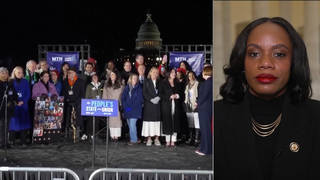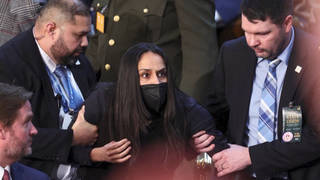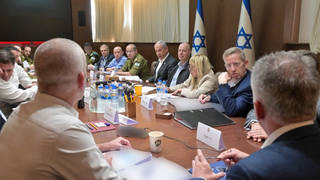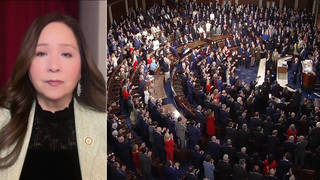
As Israel’s attack on Iran overshadows Israel’s ongoing assault on the region, we speak with Pulitzer Prize-winning Palestinian poet Mosab Abu Toha on the deepening crisis in his home of the Gaza Strip. Hundreds of starving, desperate civilians have been killed and wounded while attempting to access critical aid. Witnesses have described massacres committed by Israeli soldiers and U.S. security contractors at U.S.- and Israeli-backed aid sites that are the only officially sanctioned sources of food, water and medicine entering the Gaza Strip. “People have to go to these so-called distribution sites, and they know they will be killed,” says Abu Toha. “Israel is not letting anyone survive, not in Gaza, not in Iran, not in Syria, not in Lebanon.”
Transcript
AMY GOODMAN: This is Democracy Now!, democracynow.org. I’m Amy Goodman, with Juan González.
We turn now to Gaza, where the death toll from an Israeli attack on aid seekers in Khan Younis Tuesday has reached 70. Hundreds of Palestinians were also wounded as Israeli forces attacked using tanks, drones, machine guns on crowds gathered, hoping to receive bags of flour. A spokesperson for the Gaza Civil Defense said, quote, “Israeli drones fired at the citizens. Some minutes later, Israeli tanks fired several shells at the citizens, which led to a large number of martyrs and wounded,” unquote.
This is Dr. Mark Brunner, a doctor from Oregon who’s volunteering at the Nasser Hospital.
DR. MARK BRAUNER: Every time we know that there’s a few so-called food distribution, we know that there’s going to be annihilation. And, you know, the first couple of days, we were seeing a lot of isolated injuries, head or chest or abdomen. But today it’s reported that tanks have been used at the food distribution centers, which makes sense, because we’re seeing multi trauma. We’re seeing head, neck, chest, abdomen, extremities, many, many deaths. And it just doesn’t have to be this way. You know, this is something that’s just got to stop.
AMY GOODMAN: This comes as a group of U.N. experts in Geneva told the U.N. Human Rights Council Israel is committing war crimes and the crime against humanity of extermination.
For more, we’re joined by the Pulitzer Prize-winning poet, the Palestinian author Mosab Abu Toha. His latest piece is headlined “What Gaza Needs Now” in The New Yorker magazine. Mosab joins us from Syracuse, New York, where he has moved from Gaza with his family.
Welcome back to Democracy Now! Your latest piece is devastating. You write, “My family is starving. My neighbors are dying. I’m compelled to share these injustices because they need to stop.” Tell us about your constant conversations with people in Gaza — some soon after die — and what you’re calling for now.
MOSAB ABU TOHA: Thank you so much, Amy, for having me again. Thank you so much, Democracy Now!, for amplifying the stories that do not, unfortunately, get to be heard by mainstream media. As I said in my piece, the aim of writing these stories and sharing them with the outside world, because, you know, there was a full internet blackout for the past few days. It was fixed, and now it’s again — it’s not working. So, the hope of sharing the news and sharing stories is that these stories will not happen again and again.
And just, I mean, a few hours after I published the piece, there was another massacre of aid seekers, whether in North Gaza or in the middle of the Gaza Strip or in Rafah. If we’re going to talk about, you know, the trouble of or the risk of going to get aid, yesterday there was a massacre, huge massacre, on the Rashid Street on the beach of Gaza City. More than 60 people were killed while trying to get aid from the trucks that were entering from Israel. These 60 were just part of the 100 people who were killed only yesterday.
This morning, I want to tell you what happened today, today local time in Gaza after 3 a.m. Now in Gaza, it is 4 or 3 a.m. So, since 3 a.m., Israel bombed a tent in Khan Younis at 3 a.m. Five people were killed. Three of them were from one same family, a father and his two children. And then there were early reports that Israel was targeting Palestinians who were seeking aid near the Netzarim distribution. They call it “distribution site.” Eleven people were killed. These are confirmed people who were killed, and 70 people were wounded. And then there was an airstrike on a tent in Khan Younis, in Mawasi, Khan Younis, so-called humanitarian zone or non-combat zone. Six people were killed. And then there was another airstrike, and this is devastating. We just got the names. There was an airstrike on a house in al-Zeitoun neighborhood in Gaza City. Eight people were killed. Of them, there were seven children. And I just posted their names, if you allow me to read the names of these kids. Their names are Ziyad — Zaid, sorry — Zaid, Bisan, Mohammad, Aseel, Sama, Lama, Sa’d. So, these are seven kids from Mansour family who were killed today morning at 3 a.m. local time. And then, as we are talking, there are reports that three people were killed near the aid site in Rafah, and just an hour ago, three people were killed near the Al-Ahli Baptist Hospital in Gaza City, close to the Shurafa roundabout.
So, I just read to you the news of what has been happening in Gaza in the past, I mean, less than 12 hours, in the past 12 hours. So people continue to starve. And there are lots of lying that I hear on the news, that Israel distributed, or this so-called humanitarian foundation distributed, 13 million meals. These are big lies. What means? I mean, my family in Gaza, they have never received any meal. My wife’s family never received any meals. I don’t know where they bring these numbers. I don’t know who — how they come up with these numbers, but these are not true at all. People have to go to the so-called distribution site, and they know — they know they will be killed. And many people, when I post the videos or news of people getting killed while trying to get aid, they tell me, “Mosab, tell them not to go.” It’s like — you know what? It’s like, you know, when COVID hit, and people knew that there is a dangerous virus, and as if you’re asking, “No, don’t go out. Don’t go to buy things. Don’t go shopping. Don’t go visit. Don’t go to the hospital, because there is COVID outside.” People will not stop going out to get food for themselves and for their children, even though they know, first, they will be killed, and they know that they will not necessarily get food aid, because it’s very, very small amount of food that is getting in.
JUAN GONZÁLEZ: And, Mosab, I wanted to ask you also — the fear among Palestinians that now that Israel has launched this war on Iran, that the rest of the world will shift its focus and forget about what is happening in Gaza, and that some people believe that this is precisely part of the plan of Netanyahu, because Israel has been so discredited internationally by its attacks in Gaza. Your sense? Are the Palestinians being forgotten at this moment?
MOSAB ABU TOHA: You know what? I mean, first of all, people thought that, unfortunately, when Israel attacked Iran during the night, people thought that, in some way, that the focus of the Israeli airstrikes would be less, because they are going to move their troops or move their their F-16, their death warplanes, somewhere else — although we don’t wish anyone else in the world to be killed, right? So, people thought that this would result in less pressure, less death in Gaza. But this is not what we have seen. Unfortunately, this is not a war in Gaza. It’s a genocide that is happening, while Israel is targeting everything, people seeking aid, people who are trying to get to the hospital, and people who do not find medicine to heal, do not have healthy food to heal. So, people thought that this, in some way, would change the focus of this Israeli genocide somewhere else, without necessarily resulting in the death of so many people in other places.
But what we are watching right now is that Israel intensified its airstrikes. Yesterday, they killed about more than a hundred people, 60 of them, as I mentioned, while seeking aid in Beit Lahia, in Rafah, in Nuseirat, middle of Gaza. And today morning, just in the past 12 hours, Israel killed more than 40 people. So, it’s not like people want — the people in Gaza want people to move its killing machine somewhere else, but Israel is not letting anyone survive, not in Gaza, not in Iran, not in Syria, not in Lebanon. They continue to kill in so many places. And they say, “Oh, we are attacked by so many people. Everyone wants us to disappear from the map,” as if they are not disappearing us Palestinians in Gaza.
If you look at the — what they call evacuation orders or evacuation warnings, yesterday — five days ago, they posted a general photo, a map of Gaza, and they marked the areas that are called combat zones in red. And it’s about — it was about 70% of the Gaza Strip. One day after that, they added one more square of red into the map, so they expanded their so-called combat zone. Yesterday, they added more red areas, which means that this area should be evacuated. And so, Israel is expanding their combat zone, which is, one way or another, they are occupying this area militarily. And the more dangerous thing is not that they are marking these areas as combat zones. They are telling everyone — and this is in Arabic — they say, “Returning to this area would put your life at risk.” So, they are telling people that, “OK, we are going to tell you that this area is a combat zone, and you are not allowed to return to it.” They don’t tell you that, OK, this is a combat zone for a month, for a week, for two weeks or for a year. No, no, it is indefinitely a combat zone. If you go back there, and we ask them, “Oh, why did you kill this guy?” they say, “Oh, he returned to a combat zone,” even though this guy or that family returned, naturally, because there is no life [inaudible] —
AMY GOODMAN: Mosab, we have 30 seconds.
MOSAB ABU TOHA: They just wanted to return to find something that they left, because they couldn’t carry everything, whether it’s clothes, whether it’s shoes, whether it’s — I don’t know. This is devastating. Israel is committing these war crimes live, and we are posting about them. We are publishing the names of these children who are killed, and no one cares.
AMY GOODMAN: Mosab Abu Toha, Pulitzer Prize-winning Palestinian poet and author. We’ll link to your piece in The New Yorker, “What Gaza Needs Now: My family is starving. My neighbors are dying. I’m compelled to share these injustices because they need to stop.”
When we come back, another public official has been arrested by ICE. We’ll speak to New York City Comptroller Brad Lander. Stay with us.
[break]
AMY GOODMAN: “Jaano Jot” by Sonny Singh, performing in our Democracy Now! studio yesterday.












Media Options